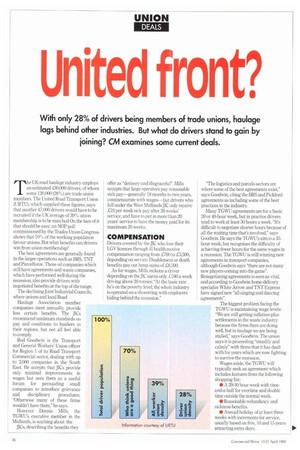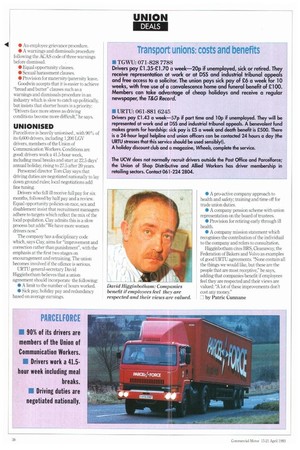United front?
Page 38

Page 40

If you've noticed an error in this article please click here to report it so we can fix it.
The UK road haulage industry employs an estimated 430,000 drivers, of whom some 120,000 (2890) are trade union members. The United Road Transport Union (URTU), which supplied these figures, says that another 47,000 drivers would have to be recruited if the UK average of 39% union membership is to be matched On the face of it that should be easy: an NOP poll commissioned by the Trades Union Congress shows that 70% of the working population favour unions. But what benefits can drivers win from union membership?
The best agreements are generally found in the larger operations such as BRS, TNT and Parcelforce. Those oil companies which still have agreements and waste companies, which have performed well during the recession, also provide drivers with negotiated benefits at the top of the range.
The declining Joint Industrial Councils, where unions and local Road Haulage Association member companies meet annually, provide less certain benefits. The JICs recommend minimum standards on pay and conditions to hauliers in their regions, but not all feel able to comply.
Rod Goodwin is the Transport and General Workers' Union officer for Region 1 of its Road Transport Commercial sector, dealing with up to 2,000 companies in the South East. He accepts that JICs provide only minimal improvements in wages but sees them as a useful forum for persuading small companies to introduce grievance and disciplinary procedures. "Otherwise many of these firms wouldn't have them," he says.
However Dennis Mills, the TGWU's executive member in the Midlands, is scathing about the JICs, describing the benefits they offer as "derisory and disgraceful". Mills accepts that large operators pay reasonable sick pay—generally 18 months to two years, commensurate with wages—but drivers who fall under the West Midlands JIC only receive £24 per week sick pay after 26 weeks' service, and have to put in more than 20 years' service to have the money paid for its maximum 20 weeks.
Drivers covered by the JIC who lose their LGV licences through ill health receive compensation ranging from .12700 to .C3,500, depending on service. Disablement or death benefits pay out lump sums of £8,500.
As for wages, Mills reckons a driver depending on the JIC earns only £160 a week driving above 20 tonnes: At the basic rate he's on the poverty level; the whole industry is operated on a shoestring with employers hiding behind the recession." "The logistics and parcels sectors are where some of the best agreements exist," says Goodwin, citing the BRS and Picicford agreements as including some of the best practices in the industry Many TGWU agreements are for a basic 39 or 40-hour week, but in practice drivers tend to work at least 50 hours a week. "It's difficult to negotiate shorter hours because of all the waiting time that's involved," says Goodwin. He says the TGWU's aim is a 35hour week, but recognises the difficulty of achieving fewer hours for the same wages in a recession. The TGWU is still winning new agreements in transport companies, although Goodwin says "there are not many new players coming into the game". Renegotiating agreements is seen as vital, and according to Goodwin home-delivery specialist White Arrow and TNT Express have signed new "all singing and dancing agreements".
The biggest problem facing the TGWU is maintaining wage levels: "We are still getting inflation-plus settlements in the waste industry because the firms there are doing well, but in haulage we are being stalled," says Goodwin. The union says it is proceeding "steadily and calmly" with firms that it has dealt with for years which are now fighting to survive the recession.
Wages aside, the TGWU will typically seek an agreement which includes features from the following shopping list: • A 39/40 hour week with timeand-a-half for overtime and double time outside the normal week.
• Reasonable redundancy and sickness benefits.
• Annual holiday of at least three weeks with increments for service, usually based on five, 10 and 15 years attracting extra days, • An employee grievance procedure.
• A warnings and dismissals procedure following the ACAS code of three warnings before dismissal.
• Equal opportunity clauses.
• Sexual harassment clauses.
• Provision for maternity/paternity leave.
Goodwin accepts that it is easier to achieve "bread and butter" clauses such as a warnings and dismissals procedure in an industry which is slow to catch up politically, but insists that shorter hours is a priority: "Drivers face more stress as driving conditions become more difficult," he says.
Pal-caul-cc: is heavily unionised , with 90% of its 6,600 drivers, including 1,200 LGV drivers, members of the Union of Communication Workers. Conditions are good: drivers work a 41.5-hour week, including meal breaks and start at 22.5 days' annual holiday, rising to 27.5 after 20 years.
Personnel director Tom Clay says that driving duties are negotiated nationally to lay down ground rules; local negotiations add fine tuning.
Drivers who fall ill receive full pay for six months, followed by half pay and a review. Equal opportunity policies on race, sex and disablement insist that recruitment managers adhere to targets which reflect the mix of the local population. Clay admits this is a slow process but adds:"We have more women drivers now."
The company has a disciplinary code which, says Clay, aims for "improvement and correction rather than punishment", with the emphasis at the first two stages on encouragement and retraining. The union becomes involved if the offence is serious.
LTRTU general-secretary David Higginbotham believes that a union agreement should incorporate the following • A limit to the number of hours worked.
• Sick pay, holiday pay and redundancy based on average earnings. • A pro-active company approach to health and safety; training and time off for trade union duties.
• A company pension scheme with union representation on the board of trustees.
• Provision for retiring early through ill health.
• A company mission statement which recognises the contribution of the individual to the company and refers to consultation.
Higginbotham cites BRS, Cleanaway, the Federation of Bakers and Volvo as examples of good URTU agreements. "None contain all the things we would like, but these are the people that are most receptive," he says, adding that companies benefit if employees feel they are respected and their views are valued: "A lot of these improvements don't cost any money."
by Patric Cinmane
















































































